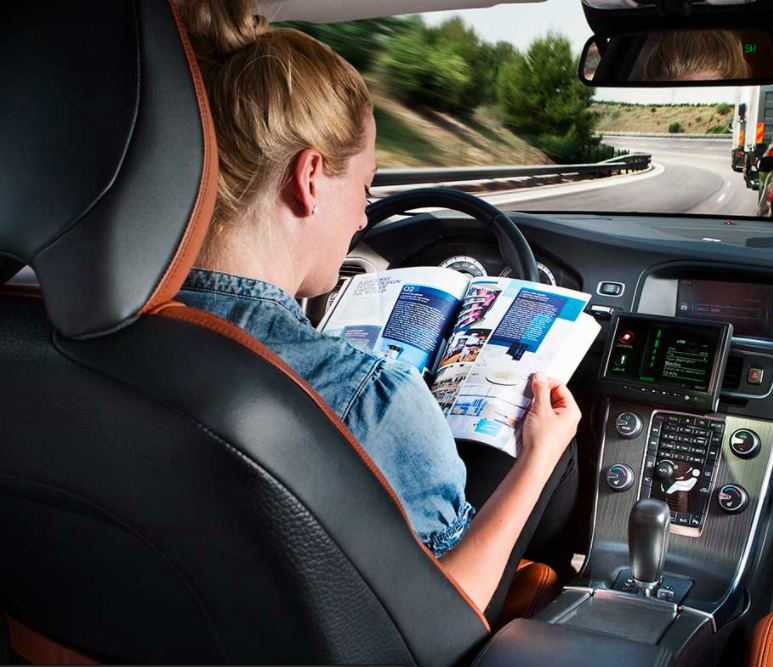Control– the power to influence or direct behavior. As a human race, we often strive for control, whether it’s at work, school, or most importantly, driving. Control gives us a sense of safety and comfort knowing that we are in charge. But what happens when we give up control to computers and unreliable software? We are in the middle of a new era, one where technology controls most everything, and everyday things like cars are changing before our eyes. According to Car and Driver magazine, mostly everyone will own a self driving car by 2025. These cars will have virtually no controls except for a keypad to type in your destination. Already, we are starting to see cars with self driving capabilities such as the well known Tesla Model S, but there have been malfunctions resulting in life threatening accidents. It all comes down to this, are we going to hand control over to technology, and trust it with our lives? I think self driving cars should never be allowed on the road, and here are some reasons why…
Autonomous cars are just like any other piece of technology– they can malfunction. There are often times, when using technology, that the screen glitches or freezes. This situation can also occur in the software installed in autonomous cars. These glitches within the cars can cause accidents that can be potentially life-threatening. Now I’m not going to lie, not having to drive three hours every weekend to my ski house sounds pretty nice, but getting into an accident does not sound appealing. For instance, multi-billion dollar car company Uber has been looking into self driving cars for a while now, and still has not been able to have a successful drive. In addition, According to Popular Mechanics Magazine, the autonomous Uber cars can only go 0.8 of a mile at max without a safety driver taking over the wheel. Recent crashes caused by software failure have made Uber temporarily “ground” its fleet of Volvo XC90 SUVs. Imagine a scenario: You’re driving down the highway in your new Tesla, the sunroof open, the cool breeze in your hair. After working a long day at the office you decide to sit back, switch on self driving mode, and watch some Netflix. Suddenly, the seventeen inch screen on your dashboard turns into a TV. Unaware of your surroundings, you didn’t notice that eighteen wheeler slowly merging into your lane, your sedan out of view to the driver. Just as you feel a nudge on your side, you look into the mirror and see the truck. As you try to brake, the car keeps on going, locked into its set path. Five minutes later, you find yourself sitting on the curb of route twenty, luckily escaping the totaled car with your life. Of course, there is a small percent chance that this would happen, but there is still always a chance. This all goes back to the car’s software, and the fact that technology is unpredictable.
Secondly, self driving cars can easily be hacked. Their software is no different from any other household technology. I mean, how creepy is that? Some random stranger can control your car from his computer. Hacking into cars can present serious security threats and danger to the passengers. In a self driving car, everything is controlled electronically opening the door for countless hackers. Do we really want to take the chances? It would take billions of dollars to create an unhackable system per car! Do you have that kind of money? I don’t think so. There have already been incidents where cars have been hacked, and we don’t even have full self driving cars yet! To demonstrate my point, Car and Driver Magazine did a test where they gave permission for a pro-hacker to hack into a 2015 Jeep Grand Cherokee’s software system. From his computer, the hacker was able to access the car’s infotainment system, brakes, speed, and even steering. The same software in that Jeep is also installed in millions of other Jeep, Chrysler, Dodge, and Ram vehicles. See how easy it is? And that car only had partial self-driving capabilities. Luckily the driver was able to override the hacker by tugging on the steering wheel, but imagine when cars don’t have steering wheels? What are you going to do then? There are plenty of scary things regarding technology, but hackers are by far the worst, especially when they are in control of your car!
Lastly, in a self driving car– you can’t drive, and what fun is that? While you might feel that driving is boring, In reality, the thrill of your foot on the pedal as you accelerate, or the strong grip on your steering wheel are both feelings that you can only find while driving. Not on your living room couch. Now, why do you think I brought up your living room? Well, in a self driving car, you don’t do anything. In fact, the only difference from your home and an autonomous car is that your home has a bathroom. You basically just sit there tediously staring at your phone until you arrive at your destination, and you can’t drive because you’re in a self driving car. This sounds pretty obvious but it’s true. In fact, lots of people enjoy driving, and I’m not talking about your commute to work, I’m talking about those beautiful winding roads in the mountains. Driving gives people a chance to take their mind off all the hard stuff in life, while also providing an exciting thrill. Do you really want to be cooped up in a glass box doing nothing for hours on end? Because I sure don’t! According to Huffpost, driving can release stress when you’re in the right environment. When filming Skyfall (James Bond film) Ben Collins, a racing driver, said: “When we filmed Skyfall I drove an Aston Martin DB5 across a mountain pass near Fort William before handing the keys over to 007. That car, with its yacht-like steering wheel and soft suspension, took me closer to heaven than anything I can remember.” Driving really should be treasured, not taken away by computers. If computers controlled our cars with no way for us to take the wheel, we would lose the pleasure, relaxation, and stress relief included in drives like Ben Collins’ in the windy mountain roads. Companies like Tesla can not take that away from us.
And it all comes down to this word: control– the power to influence or direct behavior. Yes, some people want cars that will drive them around, but is that really necessary? We as humans are getting so lazy that we can’t even drive ourselves, so some “genius” came up with the idea to make an autonomous car. I’m honestly worried about our future. Throughout this article, we’ve seen the many risks that follow “the driverless road,” and have explored the upsides of pure human intelligence. And i’ll end with this: Do we want our cars to be controlled by technology and artificial intelligence?– Or do we want the control for ourselves?


